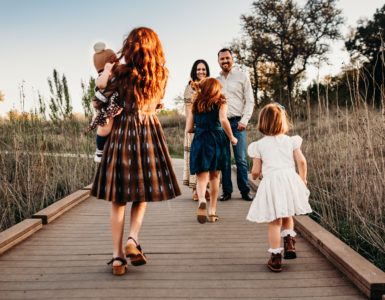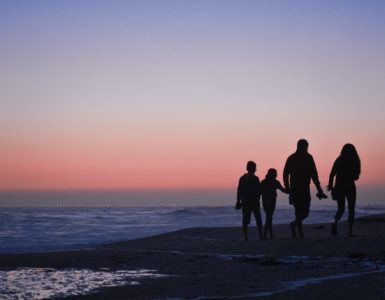It’s early January in 2019 and my husband and I are sitting in a small breakfast cafe in a tiny town in Washington state. We don’t live here but have spent the past week sharing a twin bed and an air mattress in the backroom of my aunt’s house just a few minutes away. We aren’t entirely sure of when we will return home, though we optimistically hope for next week. We haven’t slept hardly at all, my husband’s college classes have begun without him, and I’ve abandoned my high school students to a long-term substitute teacher mid-semester with no warning. Our lives have been completely upended by the tiny infant girl cuddled into my chest, who I leave in her baby carrier as we slide into a booth at the cafe. She is only a week old, born barely after midnight on Saturday morning, delivered from the body and into the hands of the incredible young woman who carried her for 9 months. She held her close for many hours before placing her in my arms and into my care and I’ve barely put her down since her adoption.
“Awww, how old is she?” the waitress brings us water and coos at the tuft of dark hair that is all you can see of our baby girl.
“Just a couple days,” my husband says, “Almost a week.” He couldn’t give a precise answer because, to be frank, we had lost track of time. The days were all a strange blur of profoundly new experiences – making bottles of formula in the middle of the night in a kitchen that wasn’t our own, laying on the couch with an infant snuggled on our chest, washing her soft dark hair in the kitchen sink. New, achingly difficult, and wonderful all at the same time.
“Wow!” the waitress responds, looking at me now, impressed, “And you’re already out and about – and looking great! Good for you, Mom.”
She smiles at me as the assumptions of her comment click into place. She’s impressed that I’m out and about not because of my recent loss of sleep, but because she presumes I’ve just given birth. She thinks I look great not because I actually brushed my hair that morning, but because she presumes I’ve just given birth.
“Oh,” I say, smiling back at her, unsure of quite how to respond, “Oh, thank you! But I didn’t give birth a few days ago, she’s adopted.”
“Oh!” the waitress responds, blinking as if she doesn’t quite know what to say next. “Oh well, that is just wonderful and she is so beautiful.” She bustles off with our orders, returning some minutes later with our food and a friend.
“This little baby is just a couple days old, they just adopted her!” she tells her coworker, smiling. The two of them smile at the baby, and then, while passing around plates of pancakes, launch into a barrage of questions that, at the time, were new to me. Did you always want to adopt? Why did you want to adopt? How did you adopt?
I remember feeling slightly overwhelmed – these questions didn’t have simple yes/no answers. How much of my story was I about to share with this random waitress in a small town cafe? How much did she really want to know? How much did I want to share?
As the years have gone on, I’ve found myself asking those same questions of myself with all sorts of people: friends, family, coworkers, the cashier at Walmart, the bank teller, the lady I see on my morning walks. How much do they actually want to know? And how much do I want to tell them about our adoption story?
The truth is, I’ve learned that, outside of the actual adoption community, actual knowledge about the adoption process and the adoption experience is relatively slim, gleaned from the largely inaccurate portrayals of adoption in pop culture. So when people find out that someone belongs to this community – whether as an adoptive parent, an adoptee, or a birth family – it opens them up to being on the receiving end of a lot of assumptions and a lot of questions. And while there are plenty of passing comments such as “she looks just like you!” that don’t require any correction or explanation, providing sincere answers to those asking real questions can go a long way to helping educate and inform everyone about the reality of adoption.
So let’s talk about the top 5 questions I always get about adoption and what we can to learn from these questions and answers.
#1 Did You Always Want to Pursue Adoption?
I get asked “did you always want to adopt?” or “why did you choose to adopt?” pretty much anytime anyone finds out about our daughter’s adoption. And though they’re phrased differently from each other, these questions are basically asking the same thing: what motivated you to adopt? And there are usually all sorts of assumptions that come with this question, that we chose adoption because of fertility challenges, that we chose to adopt to provide a good home for a baby in need, etc. Adoption comes with its own set of myths that need debunking and, though seemingly simple, an honest response to this question can go a long way. Did we always want to adopt? The short answer is sort of. We wanted to have children. We wanted to be parents. Our own families included biological children, adopted children, step-siblings, and half-siblings, so our idea of “becoming parents” was perhaps already more flexible than the traditional approach. We wanted to get pregnant. We wanted to adopt. We just wanted to be parents and the more we looked into the adoption community, the more drawn we felt. As we educated ourselves more about fertility, pregnancy, adoption, parenthood, the whole gambit, we found ourselves getting home study-ready and pursuing and adoption. So did we always want to adopt? Well, we always wanted to be parents. And over time, we came to see adoption as a normalized approach to parenthood.
That said, this is *our* story of deciding to adopt. Everyone’s story is different, so while this question might get a little old after a little while, it’s always worth asking and answering to show the diverse background of adoptive families.
#2 How Did You Find Her?
This question, like the first, comes loaded with some assumptions. Outside of the adoption community, all that is generally known about the adoption process is what is portrayed in film and television, which usually shows an orphaned or abandoned child in need of a home. So when people learn that my daughter is adopted, they’re usually curious how that came to be. Are we related to her birth parents who perhaps needed help? Was she abandoned somewhere? Is she from another country? The role of agencies, adoption lawyers, private adoptions, home studies, the birth family perspective, open adoptions, and all of the other facets involved In the process of adoption are usually unknown. So I love answering this question because it usually teaches so much more than you’d expect.
How did we find our daughter? Well, we were pursuing a private adoption and working hard to market ourselves by making our situation known to any potential birth families looking for adoptive families. A mutual friend of mine made through the adoption community became aware of an adoption situation that needed an adoptive family that met some very specific criteria: home study-approved in Washington or Idaho with at least one Native American parent that has papers to prove it. She and her family were not a fit, but she knew that we were. So she simply sent over the Facebook post and we reached out to the lawyer’s office who had made the initial post searching for a family. They connected us to the young woman they were working with and many phone calls and one nine-hour road trip later, we sat down with the girl who just a couple of weeks later asked us to parent her baby, due in just two weeks.
Again, this is our story. Not everyone’s. Ours doesn’t include international adoption, an agency, or foster care. But many stories do. So keep asking and keep telling.
#3 How Old Was She When You Adopted Her?
We met our little girl just seconds after she was born. We sat outside in the hall as she was delivered, and heard her first cries. We spent two days in the hospital with her and her birth mother, all huddled together in a hospital room alternating diaper changes and cuddle time. While our experience may not be that unusual for a domestic infant adoption, there are plenty of other kinds of adoptions where the child is older. These can include relative adoptions, international adoptions, and foster adoptions, though again each one of those also has infant adoption situations as well.
#4 Do You Want to Adopt Again?
We usually get this question anytime somebody learns that we got pregnant shortly after adopting our daughter, making her and her little brother less than a year apart. “It always happens like that!” I’ve heard time and time again. “People who can’t get pregnant finally decide to adopt and then boom, they get pregnant.” People tell me this constantly. And while the sentiment is kind and the situation undoubtedly true for many families (and untrue for just as many others), it includes some assumptions about my family that are not entirely accurate. Specifically, that we chose to adopt as a last resort because we couldn’t get pregnant and now that we’ve succeeded in getting pregnant, would we ever adopt again? And the answer is yes. Adoption is not the last resort to starting a family. Even if families look to adoption as a result of struggles with fertility, it still isn’t fair to consider adoption as the last resort, one that you don’t need to bother with if you can have children biologically. The adoption community is full of lots of different families with lots of different motives, backgrounds, and experiences. But my experience in welcoming our daughter into our family was as tender and overwhelming an experience as birth, even more in some ways. And would I grow my family similarly again, through adoption? Yes. Absolutely.
#5 Was Adoption Difficult?
“Difficult” is a complicated word when you’re talking about adoption. First of all, because it can apply to so many different aspects of adoptions. Was adoption financially difficult? Absolutely – adoptions are expensive. And we didn’t even use an agency, which is where some seriously hefty fees can come to play. Was adoption difficult physically? Hmm, sort of. Adjusting to the sleepless nights of parenthood is difficult no matter what. But I wasn’t pregnant, I didn’t experience childbirth. Was adoption difficult mentally? Emotionally? Oh, 100%. Adoption includes lots of waiting. Lots of unknowns. Lots of turmoil. Lots of pain. And this is for every party involved. I get to watch my daughter grow only because another wonderful woman gave those experiences up, at least for this baby. In gaining me, my daughter lost her. And no matter what communications we maintain, those new relationships and lost relationships and changed relationships are unique. And they’re hard.
And then there’s the difficulty involved in the adoption timeline and that has different stages too. What was most difficult: the preparing stage, the waiting for placement stage, the birth and transition stage, the waiting for finalization stage, or the actual child-rearing stage?
The short answer is yes. Adoption was difficult. Is difficult. But at the risk of sounding cliche, the phrase “nothing worth having comes easy” applies perfectly here. Having children and creating a family is not easy. With biological children, adopted children, foster children, or any child, there are always challenges. But there are also always joys. Adoption presented us with new challenges. It was difficult. But adopting our daughter gave us new joy too.
So there you have it. A few of the many questions I get about adoption and more commentary than perhaps you needed on each one. The truth is that questions are always opportunities. Opportunities to educate, opportunities to share, opportunities to learn. Adoption is so diverse, so vast, so unique. Everyone’s experiences are different. And yet all too often we don’t realize that because we simply avoid asking or answering. So let’s ask, answer, and all learn together.




